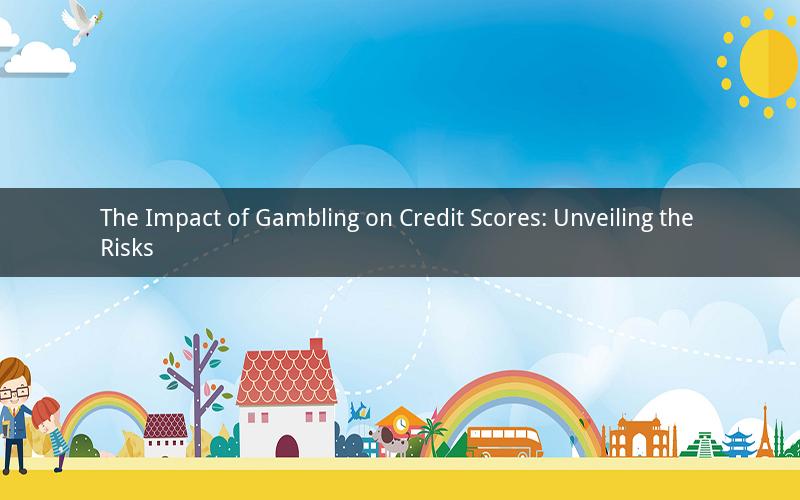
Introduction:
Gambling has always been a topic of debate, with some people seeing it as a harmless form of entertainment, while others view it as a dangerous addiction. One of the concerns surrounding gambling is its potential impact on credit scores. This article explores the relationship between gambling and credit scores, discussing the risks and how individuals can protect their creditworthiness.
1. Understanding Credit Scores:
To understand the impact of gambling on credit scores, it is crucial to first understand how credit scores work. Credit scores are numerical representations of an individual's creditworthiness, typically ranging from 300 to 850. These scores are used by lenders to assess the risk of lending money to an individual. Higher credit scores indicate lower risk, making it easier to obtain loans and credit at favorable terms.
2. The Link Between Gambling and Credit Scores:
While gambling itself does not directly affect credit scores, the financial consequences of gambling can have a significant impact. Here are some ways in which gambling can negatively affect credit scores:
a. Late Payments: If an individual accumulates debt due to gambling, they may struggle to make timely payments on their credit cards, loans, or other financial obligations. Late payments can result in a drop in credit scores.
b. High Credit Utilization: Excessive gambling can lead to a high credit utilization ratio, which is the percentage of credit available that an individual is using. A high credit utilization ratio can negatively impact credit scores.
c. New Credit Applications: Individuals who frequently apply for credit cards or loans to fund their gambling habits may have a negative impact on their credit scores. Multiple credit inquiries within a short period can be seen as a sign of financial instability.
3. How to Protect Your Credit Score:
To minimize the impact of gambling on credit scores, individuals can take several proactive measures:
a. Set a Budget: Establish a budget that allocates funds for gambling and ensures that you do not overspend. Stick to the budget to avoid accumulating debt.
b. Monitor Your Credit Reports: Regularly reviewing your credit reports can help you identify any errors or signs of identity theft that may be impacting your credit scores.
c. Pay Off Debt: If you have accumulated debt due to gambling, prioritize paying it off as quickly as possible to reduce the impact on your credit scores.
d. Avoid Multiple Credit Applications: If you are struggling to control your gambling habits, refrain from applying for new credit cards or loans, as this may further worsen your creditworthiness.
4. Seeking Professional Help:
If gambling has become an uncontrollable habit and is negatively affecting your credit score, it may be beneficial to seek professional help. Gamblers Anonymous and other support groups can provide guidance and resources to overcome gambling addiction.
5. Conclusion:
While gambling itself does not directly affect credit scores, the financial consequences of gambling can have a significant impact. By understanding the risks and taking proactive measures to protect their creditworthiness, individuals can minimize the negative effects of gambling on their credit scores.
Questions and Answers:
1. How can gambling lead to late payments and impact credit scores?
Gambling can lead to late payments when individuals accumulate debt due to excessive gambling. If they struggle to make timely payments on their credit cards, loans, or other financial obligations, it can result in late payment fees and a drop in their credit scores.
2. What is considered a high credit utilization ratio, and how does it affect credit scores?
A high credit utilization ratio is typically considered to be above 30%. When individuals use a significant portion of their available credit, it can negatively impact their credit scores as it indicates financial strain and potential reliance on credit.
3. Can seeking professional help for gambling addiction improve credit scores?
Seeking professional help for gambling addiction can indirectly improve credit scores. By overcoming the addiction, individuals can reduce their debt and make timely payments, which can positively impact their creditworthiness.
4. Is it necessary to close credit cards to improve credit scores?
Closing credit cards may not necessarily improve credit scores. Instead, it is more effective to maintain a low credit utilization ratio and make timely payments on existing accounts. If you plan to close a credit card, ensure that you have sufficient credit available on other accounts to keep the overall credit utilization ratio low.
5. Can gambling affect credit scores even if an individual does not accumulate debt?
Gambling itself does not directly affect credit scores. However, if an individual applies for multiple credit cards or loans to fund their gambling habits, it can result in multiple credit inquiries, which can negatively impact their credit scores.